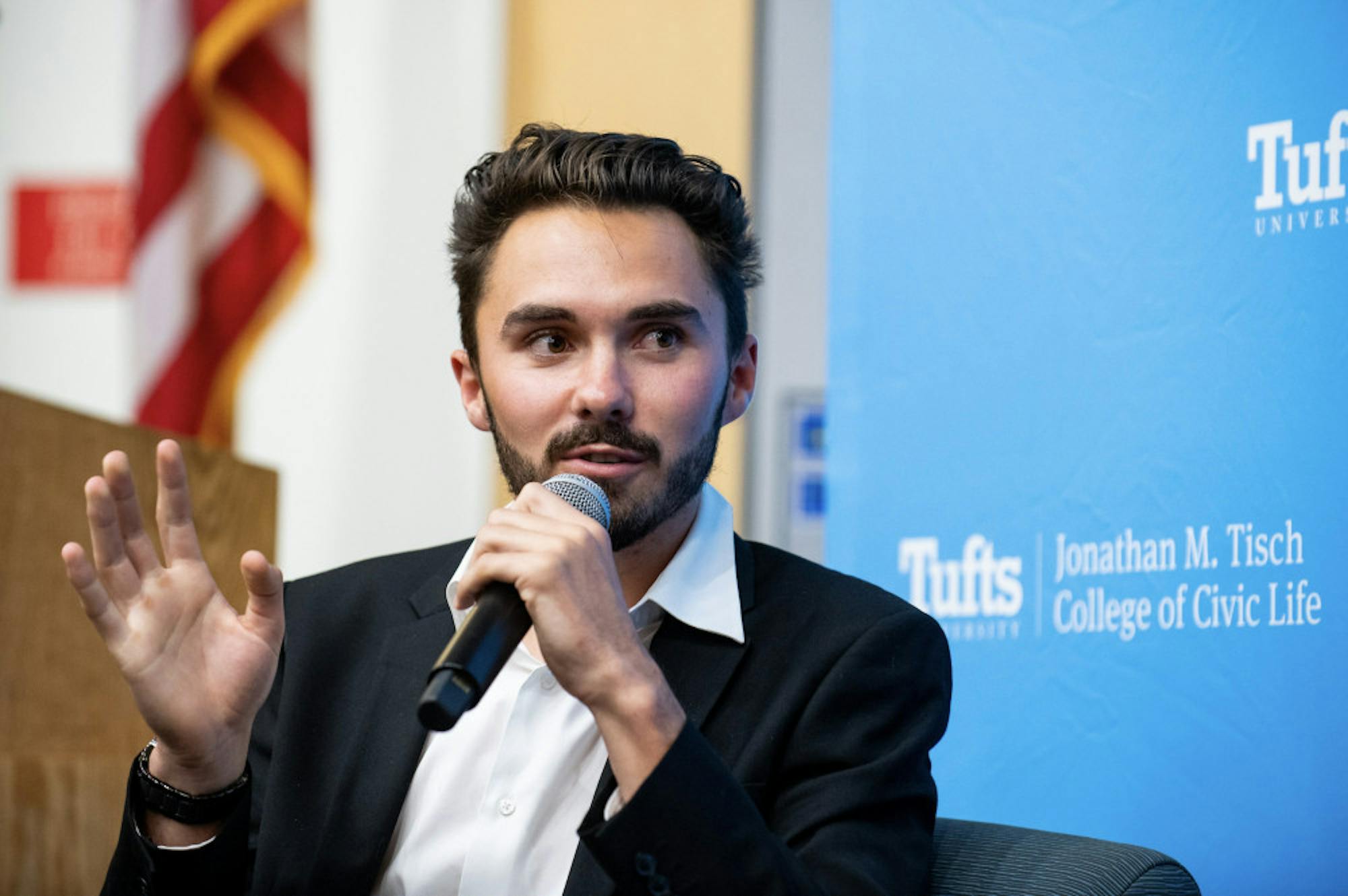David Hogg, a gun control activist who survived the 2018 Parkland school shooting, visited Tufts on Sept. 19 in the first installation of this year’s Tisch College Alan and Susan Solomont Distinguished Speaker Series. At the event, Hogg discussed his path to civic engagement, the importance of putting pressure on the government and the steps that young people can take in order to support the gun control movement.
The event was co-sponsored by the Tufts Democrats, Tufts Cooperation and Innovation in Citizenship, and the civic studies and political science departments. Dean of Tisch College of Civic Life Dayna Cunningham introduced Hogg and spoke about Tisch College’s aspirations for this year’s speaker series.
“Tisch College is centering the Solomont Speaker Series around the theme of the fight for democracy. We could not have a more fitting start to this semester than David Hogg,” Cunningham said. “Passionate in his advocacy to end gun violence, David’s mission of increasing voter participation, civic engagement and activism embraces a range of issues in the fight for democracy,”
In 2018, a mass shooter killed 17 people at Marjory Stoneman Douglas High School in Parkland, FL.Hogg and his fellow students transformed their grief into action by forming March For Our Lives, a nonprofit which seeks to end the gun violence epidemic in America.
“I think it was just being so angry after everything happened that we decided that we had to do something,” Hogg said. “For me that motivation came from the fact that my sister had lost four friends that day. … I think unfortunately, you don’t pick these issues, the issues pick you. … Activism is not voluntary; it’s something that people do to survive.”
Hogg drew attention to a correlation between communities with higher rates of gun violence and those which receive the least governmental assistance and support in the aftermath. He also applauded the work of activists fighting against these injustices that come from underserved communities.
“Erica Ford is an amazing person who everybody should know when they think about gun violence prevention,” Hogg said. “She’s been working using a model of restorative justice for the past 20 years in Jamaica, Queens to help stop young people from shooting each other. … The reason why places like Parkland don’t have shootings on a daily basis is not necessarily because we have stronger gun laws than most places in Miami-Dade County, it’s because we have a ridiculous amount of resources because of systemic racism.”
Prior to the Tisch College engagement, the Daily sat down with Hogg and discussed his visions for the future, how he grapples with feelings of hopelessness and his time at Harvard University, where he is a senior.
“My college studies have enormously impacted how I view social change, justice and the movement as a whole,”' Hogg said. “I realized that a lot of the things that I didn’t think were important are actually the most important. … I didn’t really think [community] was important because I was so dedicated to the mission … [but] this is not like a general campaign where you're trying to get somebody elected. We’re trying to get an issue elected, [and] that takes decades and many elections.”
Hogg’s time at Harvard has also allowed him to compare the inadequate gun laws in place throughout most of the country with the stricter reforms in Massachusetts, both in the academic setting and in daily life.
“If I had a magic wand and I could make anything happen, I would make every state have the same gun laws as Massachusetts,” Hogg said. “If every state had the same gun death rate as Massachusetts, there would be about 27,000 or 30,000 less deaths per year. In the average year, there are 45,000 gun deaths.”
Currently, Hogg is focused on implementing common-sense gun reform in Congress. He works directly with many legislators, Democratic and Republican, in the Senate and the House.
“There’s a suicide prevention bill that we’re working on that basically creates a voluntary ‘do not sell’ list, so that if you’re suicidal or just don’t want to be able to buy a gun you can put yourself on it,” Hogg said. “We’re trying to work with different veterans groups and Republican offices to get that done, which is a very different approach from what I would have used to have taken.”
Hogg is balancing his life as a high-profile activist and a student by taking a step back from March for Our Lives and trying to get his skateboarding club off the ground.
“I’ve managed to find more balance and be able to take my mind off the movement, which has been one of the hardest things to learn,” Hogg said. “What I’m looking forward to this year is just being a college student … just having fun, enjoying the moment and embracing every moment as it comes, and realizing that happiness is not a destination, it’s the journey.”






